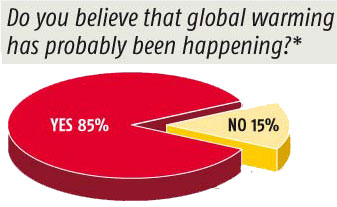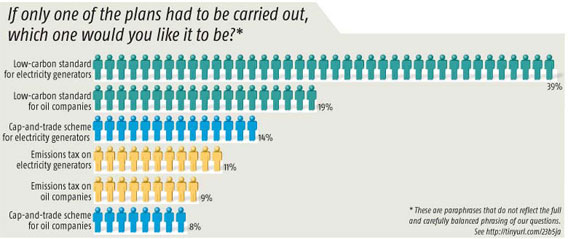Most Americans back a $10 monthly global warming tax
mongabay.com
June 20, 2007
73 percent of Americans back a $10-per-month charge to underwrite renewable energy production reports a new survey by New Scientist Magazine, Stanford University and Resources for the Future, an independent think tank. The research indicates that 85 percent of Americans believe global warming in currently happening.
The poll, conducted among 1,491 adults, shows that Americans are willing to support policies to combat global warming, provided they aren’t too costly. Americans are apparently more willing to pay for cleaner electricity than cleaner fuel, which might be a cheaper solution. The transportation sector accounts for about one third of U.S. carbon emissions, while electricty production generates about 40 percent of U.S. emissions.
“Given the probable costs, the US public has a clear preference for action in the electricity sector rather than vehicle fuel. At the lower end of the costs we quoted, all the electricity policies won majority support,” stated a joint release from the survey’s sponsors. “In contrast, none of the vehicle fuel policies gained majority backing, even at the lowest costs quoted.”

|
“A low-carbon standard for electricity generation was backed by 73 percent of respondents who were told it would cause a typical monthly bill to rise by $10,” it added. “By contrast, a cap-and-trade scheme for power companies was backed by only 47 percent at this price point.”
The survey found regional differences in support for climate change mitigation initiatives, with residents in the western United State more likely to favor such policies than those in other regions of the country. It also found that parents and people with higher incomes are also more likely to support action on climate.

“For politicians who want to find voter-friendly ways to fight global warming, our poll provides some comfort,” said Peter Aldhous, New Scientist’s San Francisco Bureau Chief.
“Our findings suggest that Americans are open to policies they think will work and that are affordable. Policy-makers who want to avoid public resistance to their proposals will find useful guidance in our numbers,” added Stanford Professor Jon Krosnick, who jointly designed the survey.







